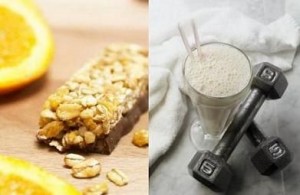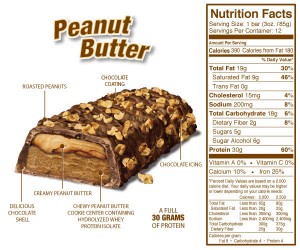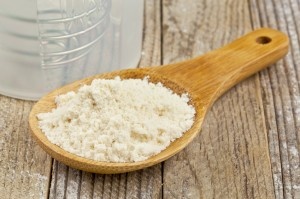Which is Better: Protein Bars or Protein Shakes?
Protein is an essential part of any fitness or muscle-building regime. The amino acids contained within protein-rich foods are used by the body to repair muscles after exercise. Getting the right combination of exercise and protein consumption is the ideal way to increase the size and strength of muscles, tone up the body and raise the metabolism. Two of the most popular protein-boosting products on the market are protein bars and protein shakes. Let’s take a look at the relative merits of each to find out which is the best option for a post-workout snack.
Protein Content
The amount of protein in popular protein bars varies widely. Bars that are designed to boost protein intake generally contain around 30 grams per bar. However, you need to watch out for the “energy bars” that are also marketed at keen gym-goers. Although similar in appearance, these bars are packed with sugar and carbohydrates and only contain around 10-15 grams of protein. Although energy bars are useful sources of energy to get you through your workout, if you eat them after working out then all that sugar will be turned to fat as it won’t be burned off. Stick to bars that are high in protein and low in carbohydrates for a post-workout protein boost.
Alternatively, you could use protein shakes to boost your protein intake either before or after working out. A protein shake made up from a single scoop of protein powder contains between 20 and 25 grams of protein, with the exact value depending on the composition of the protein powder.
Protein bars often contain slightly more protein than protein shakes, so you don’t need to eat as many of them to reach your recommended protein intake. The International Society of Sports Nutrition recommends that exercising individuals consume between 1.4 and 2 grams of protein per kilogram of body weight each day. The majority of this protein should come from your meals, in the form of lean meat, fish, eggs, or beans, but protein bars and shakes can also help you to meet the target. Eating five protein bars per week will provide approximately 150 grams, which is approximately 20% of the minimum recommended amount for a 70 kg active adult. You would need to drink 6 or 7 protein shakes to get the same amount.
Protein Absorption
Many protein shakes on the market solely or primarily consist of whey protein, which comes from cow’s milk. Whey is one of the most rapidly absorbed types of protein, which means these shakes are ideal for delivering a quick burst of protein to your muscles after exercising. Protein bars, on the other hand, usually contain a blend of different protein types. As a result, they absorb more slowly, which could leave you feeling fuller for longer but will mean that your muscles will have longer to wait for the protein they need to begin repairing themselves.
Many people have intolerances that mean they cannot digest dairy or soy, both of which are common ingredients in protein shakes and bars. If you are affected by a food intolerance or allergy, make sure you choose a protein supplement that is suitable for you. Consuming foods that irritate your digestive tract will lead to poor absorption of protein and other nutrients.
Calorie Content
Protein bars contain more calories than protein shakes, which is something you need to take into account if you are trying to lose weight. A protein bar typically contains between 200 and 400 calories, while a scoop of protein powder is around 120 calories. However, protein bars also contain dietary fiber, which can lead to a longer-lasting feeling of fullness.
Protein Bars vs. Shakes: The Verdict
If you are trying to lose weight at the same time as getting fit, protein shakes may be the better option. You could even use meal replacement shakes, which give you the nutrients you need to stay healthy without any empty calories. However, many people find protein bars more convenient than protein shakes. Eat several bars per week or drink a shake every day to get a significant contribution towards your recommended protein intake.
Do you prefer protein bars or protein shakes? Neither? What are you primary sources of protein? Leave a comment!
5 Responses to Which is Better: Protein Bars or Protein Shakes?
Leave a Reply Cancel reply
Your email address will not be published. Required fields are marked *
*
*
You may use these HTML tags and attributes: <a href="" title=""> <abbr title=""> <acronym title=""> <b> <blockquote cite=""> <cite> <code> <del datetime=""> <em> <i> <q cite=""> <strike> <strong>
Join Our Community
Archives
- January 2023
- December 2022
- September 2022
- August 2022
- June 2022
- May 2022
- April 2022
- March 2022
- February 2022
- January 2022
- December 2021
- November 2021
- October 2021
- September 2021
- August 2021
- July 2021
- June 2021
- May 2021
- March 2021
- September 2020
- August 2020
- July 2020
- June 2020
- May 2020
- April 2020
- March 2020
- February 2020
Subscribe

Sign up to receive FREE toolkit
From Dr. Hyman, #1 NY Times & Amazon Author
We never spam or sell your e-mail










I use shakes — they fit into my lifestyle and the protein bars usually taste like candy bars to me and that is a “trigger food” for me! Since I am a vegan I use pea protein or hemp protein. The pea protein is higher in protein per serving so that’s my main choice!
[...] Zucchini bread or bust. [...]
To say that “all that sugar will turn into fat because it won’t be burned off” instantly discredits this author and what he thinks he is trying to accomplish. While eating a lot of protein and the way that you get it is important it is also important to have sugar post workout to replace glycogen stores and allow “all that protein” to be absorbed and used for repairing muscles. Plus your body can deal with sugar, it’s normal and can be processed. Too much can lead to things like diabetes, obesity, and other diseases but to eat an energy bar post workout is perfectly acceptable. This author sounds like he pulled some of this out of a “Gym’s Personal Trainer Handbook”. They try and teach incomplete facts and sell them as fact. Do your research and know that sugar is not all bad. The type of sugar is important but don’t just let people tell you that sugar turns to fat. Remember, calories in vs. calories out. Good calories vs. bad calories.
yuck neither….. organic greek yogurt, beans and fish. I am a pescaterian…fish, dairy and veggies
Woah this weblog is excellent i like reading your articles. Keep up the good work! You realize, lots of persons are looking round for this info, you can aid them greatly.